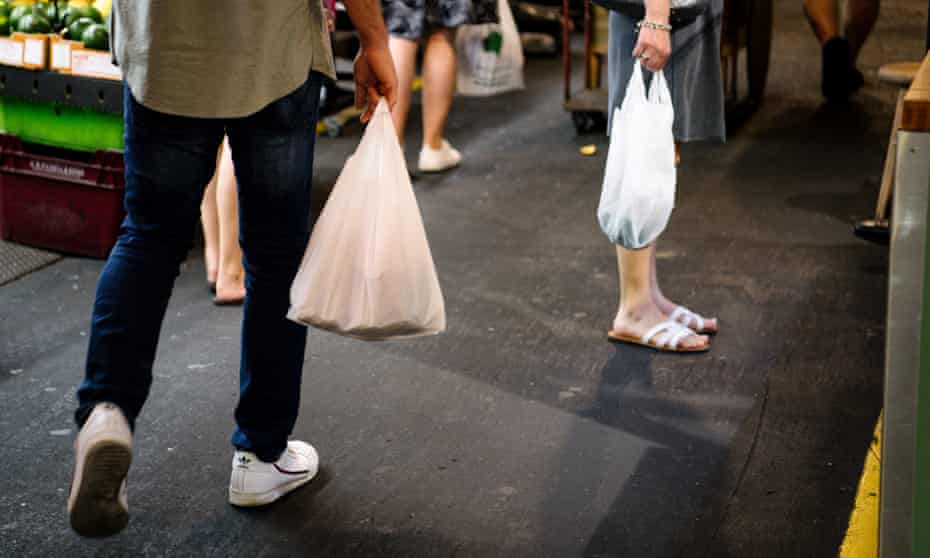NSW plastic bag ban: how will it work and what will be gained from it?
Lightweight plastic bags will be banned from Wednesday, with distributors being the initial targets

Single-use plastic bags will be banned in New South Wales this week. The decision follows similar moves in other states and by major retailers.
We take a look at what this means for shoppers and businesses, and how it will be enforced.
What is being banned?
From Wednesday, lightweight plastic bags – that are less than 35 microns in thickness at any part – will be outlawed. This includes biodegradable, compostable and bioplastic bags.
The ban will not apply to bin liners, dog-poo bags, and the thin bags for fresh produce and deli items in supermarkets. Bags used for medical items will also be also exempt.
The NSW environment minister, James Griffin, says single-use bags are convenient but their impact is undeniable, so they need to go.
“Single-use plastic is used by many of us for just a few convenient minutes, but it remains in our environment for many years, eventually breaking into microplastics,” he says.
“Single-use plastic items and packaging make up for 60% of all litter in NSW.”
Are more measures on the way?
From 1 November, single-use plastic straws, cutlery, chopsticks and food picks will also be banned. As with the bags, this will also cover biodegradable, compostable and bioplastic products but will not extend to wooden implements.
There will be some exemptions to the rule, including allowing people with disabilities or medical needs to use plastic straws.
Serving utensils such as salad servers and tongs will also be exempt, as well as plastic items on packaging – including straws on the side of juice boxes and plastic film lids on containers.
Expanded polystyrene containers, like those used for halal snack packs and fish and chips, are also set to be banned. Other items including meat and produce trays will not be included in the ban.
In the bathroom, microbeads in some personal care products such as those used in exfoliants and masks will be banned, alongside single-use plastic cotton buds.
What’s wrong with biodegradable, compostable and bioplastic alternatives?
The government decided to include these alternative materials – widely seen as eco-alternatives to conventional plastic – because they often do not biodegrade unless they are treated in an industrial composting facility.
They argue this will create a problem if they were not banned at the same time, despite the gradual rollout of food and organic waste (FOGO) bins across the state.
How will the ban be enforced?
Businesses and distributors caught giving out single-use plastic bags will face fines of between $11,000 and $250,000, but it will be the plastics distributors that regulators target initially, Griffin says.
Work has also been done with the National Retailers Association (NRA) to get retailers and businesses across the details ahead of the two-stage ban implementation. They can call a free hotline that has been set up by the NRA for advice on how to transition away from plastics.
How much plastic waste will be saved?
The government estimates that 2.7bn items will be stopped from entering landfills and the environment over the next 20 years as a result of the ban.
The move is part of a state government push to reduce plastic litter by 30% by 2025 as part of a wider $356m five-year plan that included the rollout of green FOGO bins by 2030.
Isn’t NSW getting to this a bit late?
South Australia was the first Australian state to ban single-use plastic bags, with an exemption for biodegradable bags, back in 2009. It then strengthened its stance with further bans on single-use straws and other items last year.
The ACT implemented its own ban in 2011 before Tasmania followed in 2015. Queensland then imposed its own ban in 2018 before Western Australia, the Northern Territory and Victoria in 2019.
Major retailers have also moved on this already, with Woolworths and Coles almost simultaneously bringing in bans on single-use plastic bags in 2018.
Email: sign up for our daily morning briefing newsletter
App: download the free app and never miss the biggest stories, or get our weekend edition for a curated selection of the week’s best stories
Social: follow us on YouTube, Facebook, Instagram, Twitter or TikTok
Podcast: listen to our daily episodes on Apple Podcasts, Spotify or search "Full Story" in your favourite app
","image":"https://plastic.education/wp-content/uploads/2022/05/4442.jpg","credit":"Photograph: Tim Robberts/Stone RF","pillar":0}”>
Quick Guide
How to get the latest news from Guardian Australia
Show

Email: sign up for our daily morning briefing newsletter
App: download the free app and never miss the biggest stories, or get our weekend edition for a curated selection of the week’s best stories
Social: follow us on YouTube, Facebook, Instagram, Twitter or TikTok
Podcast: listen to our daily episodes on Apple Podcasts, Spotify or search “Full Story” in your favourite app
Griffin says NSW was making sure it got it right and had been developing a robust and thorough suite of policies, including the container deposit scheme.
“We’ve worked long and hard on the NSW plastics plan,” he says.
“You’ve got to look at plastic in the entire waste stream, so how it’s produced, how it’s distributed and how it’s recycled.
“Our single-use ban that comes into effect next week and then followed by the more comprehensive one in November will see us through to the head of the pack nationally.”
